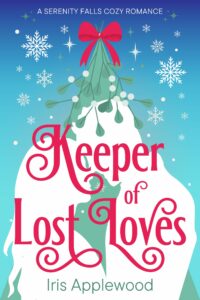I would like to introduce you to fellow writer and friend Iris Applewood author of Keeper of Lost Loves. I met Iris through an online authors’ group associated with Author Accelerator.
Iris is passionate about creating cozy romances with a touch of magic. Her first book in the Serenity Falls series came out this summer:
Keeper of Lost Loves:

A heartwarming tale of legacy, love, and the magic of new beginnings.
Clara Winters is a self-proclaimed cynic of soulmates. But when mistletoe magic compels her to play matchmaker for the town curmudgeon, her life takes an unexpected turn.
Clara’s only Christmas wish is to save her beloved Fireside Manor Bed and Breakfast, teetering on the edge of financial ruin in the outskirts of the quaint town of Serenity Falls.
Her plan is simple: drop off her cookies at the Winter Festival and return to welcome her lone holiday guest.
The arrival of Ethan, a guest with enigmatic intentions, sets off sparks of both romance and suspicion. As their paths intertwine, Clara and Ethan embark on a journey of amateur sleuthing, unearthing long-buried stories that are as entwined with Fireside Manor as they are with their own destinies.
In this cozy Christmas romance, each kiss under the mistletoe is a key to unlocking hidden truths, mending past heartaches, and discovering the enduring power of connection.
Join Clara in her enchanting adventure as she navigates the complexities of heart and heritage, learning that love is more resilient, more enduring, than she’d ever given it credit for.
This story is perfect for those seeking a sweet, low spice small town romance with a sprinkle of mystery and a dash of magic.
Victoria Marie Lees: Congratulations, Iris. And thank you for visiting with me at Adventures in Writing.
Iris Applewood: My pleasure.

VML: Iris, what made you decide to become a writer and how long have you been writing? How did you choose cozy romance, with a dash of magic, as the genre to write?
IA: Up until 2022, my writing had been pretty academic—long lists of peer-reviewed journal articles and research reports. A decade working as a research analyst will do that to you. But I had this nagging feeling that there was something more out there for me, a creative itch that refused to go away. I used to love writing stories as a kid, but somewhere along the way, life happened, and I lost that spark.
Then one day, I awoke from a dream with the kind of clarity that only seems possible in those foggy moments right before dawn. (I know, I know—starting with a dream is such a cliché, but sometimes life really does imitate bad art.) But this dream kick-started my journey into writing. My first novel, which remains unpublished for now, all began after that dream, when I thought, “I would read this book.” But first I needed to write it.
First novels are tough, though; eventually, I wanted a break from it, to write something as far from YA occult as I could. So I decided on cozy romance as a palate cleanser, so to speak. I do love a good Hallmark Christmas Romance, after all. And that’s how Keeper of Lost Loves got its start.
These days, I love blending heartwarming tales with a sprinkle of the mystical, creating worlds where readers can escape and find a little bit of magic in the mundane.
VML: I created stories as a kid, too, Iris. And I love a good Hallmark Christmas Romance. You’re right, though. Life has a tendency to get in the way of creativity sometimes.
Your novel deals with feeling connected in family as in life. Trust and second chances are important. And not allowing the past to control your present. Why are these themes important to you?
IA: These themes hit close to home for me, both in my life and in my writing. As a sociologist, I’ve always been fascinated by the invisible threads that connect us—how our family ties, past experiences, and social circles shape who we are. My academic background taught me to see these connections clearly, but it also taught me something crucial: we have the power to snip those threads if they’re holding us back and grab onto new ones that propel us forward.
On a more personal note, surviving a widowmaker heart attack at 40 will really make you sit up and reevaluate your priorities. (Spoiler: chasing deadlines didn’t make the cut.) Facing my own mortality was a slap in the face from the universe. It forced me to realize what truly matters: family, community, and doing work that fills your soul. It felt like I’d been handed a second chance—much like Clara and the other characters in my novel who find ways to heal old wounds and embrace new connections.
Trust and second chances resonate with me in a big way these days. After nearly punching my one-way ticket out of here, I’m more willing to take risks, to trust, and to open up to new possibilities. I’ve learned that life’s too short to let the past hold the reins. Choosing to live in the now, to focus on the relationships and opportunities right in front of me, is incredibly liberating. It’s allowed me to grow, to forgive, and to find joy in places I never thought to look.
Ultimately, I think we’re all just searching for connection—whether that’s with our own true selves, with others, or with something bigger than us. Writing about these themes lets me explore the messy, beautiful complexity of human relationships and the transformative power of love, trust, and forgiveness. My hope is that readers will see a bit of themselves in these stories, maybe feel a little less alone in their own journeys, and be inspired to seek out their own second chances.
VML: This is powerful, Iris. Who in life wouldn’t want a second chance if they could, whether it be from a medical scare or through choices we have made. You are correct. There is transformation in love, trust, and forgiveness.
This process of writing and re-writing can be a tedious one—especially for full-length novels. How do you know when your novel is ready for the presses?
IA: Ah, the million-dollar question! Keep in mind, my first novel is still unpublished. My first publication is the second novel I wrote. The truth is, it’s never easy to say, “Okay, this is it!” and actually mean it. But I’ll give the question a shot:
First off, I listen to my gut. Do I have a deep-down sense of satisfaction when I read through the manuscript? Does the story feel whole? If I can read it and say, “Yes, this is the story I wanted to tell,” then I know I’m getting close. The problem is, this trick will not work for perfectionists, or people who are overly self-critical.
Which brings me to the importance of getting feedback from trusted beta readers and editors. This part is crucial because, let’s face it, we writers can get a little too close to our own work. Having other eyes on the manuscript helps me see the story from different angles. If they’re pointing out the same things that have been nagging at me or if their feedback lights up a corner I hadn’t even thought about, I know I’ve still got work to do.
Then there’s the dreaded rewrite phase, where I’m pretty sure I’ve rewritten some scenes so many times that the characters are threatening to unionize. But if I can make it through that phase, polish everything until it shines, and still enjoy reading my own book, that’s a good sign it’s ready.
At some point, you have to release your grip and trust that the story will resonate with readers. No book will ever be perfect. There will always be a sentence you think could be better or a scene that makes you second-guess. Perfection is a myth. If I waited for perfect, I’d never publish anything. So I aim for “done” instead of “perfect,” and once I reach that point, I know my novel is ready for the world.
VML: So true. Perfection IS a myth. Although I have trouble with it. So I look for what bothers the critique reader to see if it is something that troubles me as well. This helps me distinguish what is truly a problem and what is just in my head.
How did you decide to indie-publish? Could you offer any advice to writers trying to indie publish their first novel?
IA: Honestly? Traditional publishing takes forever. After two years of pouring my heart and soul into writing, I just didn’t have the patience to wait around for someone else to tell me my book was good enough. I wanted to get my story out there while it still felt fresh to me. Plus, I’m pretty sure I would’ve died of old age waiting for an agent to say, “Yes, let’s do this.”
But impatience wasn’t my only reason. I’m a research junkie (that degree is still paying off!), so I spent a lot of time weighing the pros and cons. With indie publishing, I get to keep the rights to my book. It’s mine to do with as I please. Want to turn it into a graphic novel? Sure. Turn it into a stage play featuring interpretive dance? Why not? Plus, the financial side is appealing. You get a bigger slice of the pie with indie publishing. Though, fair warning—you also have to bring your own pie to the table, so to speak. There’s more up-front investment, but you have control over everything. And I sort of have a pathological need to have my hands on the wheel.
Also, I love a good challenge. I’m pretty techy, a bit artsy, and not afraid to roll up my sleeves and dig into marketing. I wanted to see if I could do it. There’s something incredibly satisfying about being in charge of the whole process.
As for advice? Oh boy, there’s enough advice out there to drown in. And half of it will contradict the other half. My advice? Find one or two experts you trust and tune out the rest. For me, that’s David Gaughran and Sarra Cannon. They’ve got the goods, and their advice is gold. Also, surround yourself with a supportive community. Join a writer’s group with people who are at the same stage as you are. I’d recommend checking out the 20booksto50k group on Facebook—it’s a treasure trove of info and support. And get a mentor. But not someone too far ahead of you, because they might forget what it’s like to be in your shoes. Look for someone just a few steps ahead, someone who still remembers the struggle.
VML: Keeper of Lost Loves shines beautifully, Iris. You’ve landed this one! Being techy helps with indie publishing, I’m sure. Thank you for these suggestions on where to find advice.
Yes, a writer needs to be a marketer as well in today’s publishing world. How do you wear these two hats [Writer and Marketer]? Can you offer any advice to other writers about marketing their books?
IA: Now, here’s the thing that I have to remind myself constantly: marketing is crucial, but it’s not an excuse to procrastinate on finishing or publishing your book. Trust me, it’s easy to get lost in the weeds of creating the perfect website or endlessly tweaking your social media profiles and use these as stall tactics. Don’t fall into that trap. At some point, you have to hit publish and let your book fly.
Also, marketing isn’t something you do once the book is out in the world—it starts way before that. Start building your platform early (whether it’s through social media, or other avenues). Even while you’re writing your novel, you should be building a presence, engaging with potential readers, and creating buzz. Share snippets of your work, insights into your writing process, or just to connect with your audience on a personal level. Let them get to know you and your voice. This way, by the time your book is ready to launch, you’ve already got a group of people who are excited to read it.
Consider starting an email newsletter. It’s one of the most direct ways to communicate with your audience. Offer something of value to get them to sign up—a short story, a free chapter, or some writing tips. Then keep them updated on your writing journey, upcoming releases, and any events you’re planning. This builds a relationship with your readers and keeps them invested in your work.
Another tip? Engage with book bloggers and reviewers early on. Don’t wait until your book is ready to launch to start reaching out. Build those relationships now. Send them ARCs (Advanced Reader Copies) so they can review your book ahead of your launch date. Their reviews can help create buzz and give your launch momentum.
Remember, marketing is about building relationships and creating excitement for your book. But it should never become a way to avoid the hard work of writing and finishing your manuscript. Balance is key. Write first, then market. Your book deserves the best chance it can get, and so do you. But first, you need a book.
Finally, knowing your limits is key. Do what you can yourself, but don’t be afraid to pay for the stuff you’re not good at. Book covers, blurbs, marketing—these are all specialized skills. Build a team you can trust to handle those aspects so you can focus on what you do best: writing.
Remember, indie publishing doesn’t mean you have to go it alone. It just means you get to pick your crew.
VML: Solid advice here, Iris. Thank you! And thanks for stopping by my Adventures in Writing blog.
You can connect to Iris Applewood online at her website. She is on Facebook https://www.facebook.com/irisapplewoodauthor/
and Instagram. https://www.instagram.com/irisapplewood/
If you are interested in a paperback edition of Keeper of Lost Loves, please go to your independent bookstore and ask them to order the book. We need to support indie bookstores.
Otherwise, you can find her book online at: https://books2read.com/keeperoflostloves
Iris Applewood’s next book is Fragrance of Forgotten Truths. She’s more than halfway through writing it. I can’t wait to read it!
Thanks again, Iris, for sharing your insight. All the luck with your new romance series. Bravo!


Congrats to Iris on her book. It sounds like a great cozy story for the holidays.
Yes it is, Natalie. Thank you so much for note. It’s always a pleasure seeing you here at Adventures in Writing. Have a beautiful weekend!
Thanks, Natalie!
Thank you so much for a lovely interview, Victoria! Your questions were throught-provoking and inspiring.
My pleasure, Iris. I love learning about other author’s experiences publishing their work. I wish you every success in the future. Thank you for visiting Adventures in Writing.
This was so helpful, and many congratulations to Iris! The book sounds lovely. I really enjoyed reading about her experiences, and I completely agree with what she said about finding one or two experts to trust. Like she mentioned, there’s so much advice out there and it’s hard to know what to use. I’ve found that sticking to a few things which work for me is so helpful.
Iris is a very knowledgeable writer, Damyanti. The trick is to find that expert to trust. “Sticking to a few things which work” for you is key.
Thank you so much for sharing your insight here at Adventures in Writing. It’s greatly appreciated. Have a beautiful Sunday!